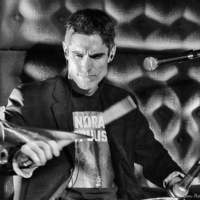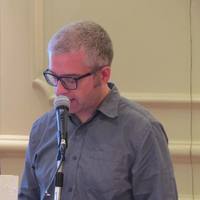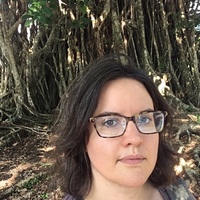
Sven Bjerstedt
Senior lecturer in Music at Malmö Theatre Academy, Lund University;
PhD and Reader (Docent) in Music Education Research at Malmö Faculty of Fine and Performing Arts, Lund University.
PhD and Reader (Docent) in Music Education Research at Malmö Faculty of Fine and Performing Arts, Lund University.
less
Related Authors
Noel B. Salazar
KU Leuven
Gareth Dylan D Smith
Boston University
Gerard Steen
University of Amsterdam
Beatriz Ilari
University of Southern California
Vayos Liapis
Open University of Cyprus
Alessandro Bertinetto
Università degli Studi di Torino
Julia Hell
University of Michigan
Rachel E Smith
University of Aberdeen
John Sutton
Macquarie University
Eric Hamako
Shoreline Community College
InterestsView All (9)










Uploads
Books by Sven Bjerstedt
The investigation is divided into three studies. The first study focuses on different perspectives on musicality in the field of music, based on explorative literature studies. The second study focuses on a sample of citations from literature on theatre where musicality and related concepts seem to be put forward in interesting and relevant ways in connection with spoken theatre. The third study is based on a series of explorative interviews with experienced Swedish actors and directors.
The results of the first study indicate that (i) references to art forms other than music are very rare among musicologists discussing the concept of musicality; and (ii) there are reasons to distinguish between different perspectives on musicality, for instance, between an absolute, a relativistic and a relational view.
The second study is divided in two sections, one chronological and one systematical. The historical overview presents and discusses three ideals or paradigms of theatre: the rhetorical, the realistic and the modernistic ideal. The systematic overview is structured in accordance with the different practitioners’ perspectives that are put forward: views related to ”musical dramaturgy” as well as the views of directors, educators and actors. Educational and professional theatre discourses through history as well as today are shown to include a great variety of perspectives on music and musicality.
A detailed analysis of the interviews in the third study indicates that the concept of musicality as understood and used by the interviewees can be interpreted as a combination of abilities in the actor. It is suggested that these abilities may be divided in three groups, all of which constitute necessary conditions for the actor’s musicality: acting and being ”here and now” with all senses (”presence”); apprehending, analysing and building structures (”structure”); and acting and being free, relaxed, active and open (”flow”).
In conclusion, the results of the study seem to indicate that the term ’musicality’ is often applied in the field of theatre in a way that could be understood as metaphorical. Based on these results, it would seem potentially fruitful to regard ’musicality’ in theatre discourse as a socially constructed concept with important artistic, educational as well as sociological implications.
The framework of the study includes theories of narrativity and of metaphor as well as educational and sociological perspectives. The study aims at an exploration of a multivariety of perspectives. Accordingly, the analysis of the empirical study – which consists of qualitative interviews with fifteen jazz musicians – as well as of relevant previous writings is carried out by means of a broad inclusionist hermeneutic approach. Throughout the multitude of issues thus explored, qualities of openness, wholeness, and listening stand out as crucial to jazz improvisation and to musicians' understanding of it as 'storytelling'. The quality of temporality permeates any improvisational activity; the results of the study are structured in accordance with this perspective.
The study points to several implications of the usage of the concept storytelling regarding jazz improvisation. From a theoretical point of view, the results exemplify the bidirectional function and relevance of rich intermedial metaphoricity on a conceptual level. Artistic implications of the usage of 'storytelling' in jazz contexts include the dynamics between structural and communicative aspects of the music, as well as the dynamics of different kinds of authenticity: on one hand, authenticity regarding the tradition in which the improviser is situated; on the other, authenticity regarding the improviser's own individuality. With regard to educational issues, the multivariety of required artistic skills in the improviser arguably calls for a rich learning ecology framework including collective, experiential, and exploratory approaches to improvisation. From a sociological point of view, the storytelling metaphor is shown to function as a kind of exclusionist counterdiscourse employed by an older generation of musicians against a younger one, by an autodidactic musical culture against an educationalist one, or by advocates of authenticity against technical proficiency.
In conclusion, the concept storytelling as a rich intermedial metaphor is shown to be significant to the practice and reflection of performing artists through its ability to mediate holistic views of what is considered to be of crucial importance in artistic practice, analysis, and education.
Papers by Sven Bjerstedt
The investigation is divided into three studies. The first study focuses on different perspectives on musicality in the field of music, based on explorative literature studies. The second study focuses on a sample of citations from literature on theatre where musicality and related concepts seem to be put forward in interesting and relevant ways in connection with spoken theatre. The third study is based on a series of explorative interviews with experienced Swedish actors and directors.
The results of the first study indicate that (i) references to art forms other than music are very rare among musicologists discussing the concept of musicality; and (ii) there are reasons to distinguish between different perspectives on musicality, for instance, between an absolute, a relativistic and a relational view.
The second study is divided in two sections, one chronological and one systematical. The historical overview presents and discusses three ideals or paradigms of theatre: the rhetorical, the realistic and the modernistic ideal. The systematic overview is structured in accordance with the different practitioners’ perspectives that are put forward: views related to ”musical dramaturgy” as well as the views of directors, educators and actors. Educational and professional theatre discourses through history as well as today are shown to include a great variety of perspectives on music and musicality.
A detailed analysis of the interviews in the third study indicates that the concept of musicality as understood and used by the interviewees can be interpreted as a combination of abilities in the actor. It is suggested that these abilities may be divided in three groups, all of which constitute necessary conditions for the actor’s musicality: acting and being ”here and now” with all senses (”presence”); apprehending, analysing and building structures (”structure”); and acting and being free, relaxed, active and open (”flow”).
In conclusion, the results of the study seem to indicate that the term ’musicality’ is often applied in the field of theatre in a way that could be understood as metaphorical. Based on these results, it would seem potentially fruitful to regard ’musicality’ in theatre discourse as a socially constructed concept with important artistic, educational as well as sociological implications.
The framework of the study includes theories of narrativity and of metaphor as well as educational and sociological perspectives. The study aims at an exploration of a multivariety of perspectives. Accordingly, the analysis of the empirical study – which consists of qualitative interviews with fifteen jazz musicians – as well as of relevant previous writings is carried out by means of a broad inclusionist hermeneutic approach. Throughout the multitude of issues thus explored, qualities of openness, wholeness, and listening stand out as crucial to jazz improvisation and to musicians' understanding of it as 'storytelling'. The quality of temporality permeates any improvisational activity; the results of the study are structured in accordance with this perspective.
The study points to several implications of the usage of the concept storytelling regarding jazz improvisation. From a theoretical point of view, the results exemplify the bidirectional function and relevance of rich intermedial metaphoricity on a conceptual level. Artistic implications of the usage of 'storytelling' in jazz contexts include the dynamics between structural and communicative aspects of the music, as well as the dynamics of different kinds of authenticity: on one hand, authenticity regarding the tradition in which the improviser is situated; on the other, authenticity regarding the improviser's own individuality. With regard to educational issues, the multivariety of required artistic skills in the improviser arguably calls for a rich learning ecology framework including collective, experiential, and exploratory approaches to improvisation. From a sociological point of view, the storytelling metaphor is shown to function as a kind of exclusionist counterdiscourse employed by an older generation of musicians against a younger one, by an autodidactic musical culture against an educationalist one, or by advocates of authenticity against technical proficiency.
In conclusion, the concept storytelling as a rich intermedial metaphor is shown to be significant to the practice and reflection of performing artists through its ability to mediate holistic views of what is considered to be of crucial importance in artistic practice, analysis, and education.
Musical practice embodies temporal phenomena like pulse, tempo, timing, ad lib, accelerando and fermata. The musical present can be viewed as a moment of semantic fullness, a meaningful moment. Music can carry narrative, which is a related phenomenon, also containing intrinsic temporality. Furthermore, music can be improvised in the present moment. The tonal texture of music is experienced as a context, a coherency with an intrinsic temporality. This symposium is set to investigate how music can be experienced, philosophically speaking, in the present moment. In order to do this, we introduce a number of prominent Western philosophers who have taken an interest in the phenomenon of time by using the phenomenon of music as a lens: Saint Augustine, Husserl, Bakhtin and Ricoeur.
After this introductory presentation, the symposium continues as a dialogue between the perspectives provided by these philosophers.
The framework of the study includes theories of narrativity and of metaphor as well as educational and sociological perspectives. The study aims at an exploration of a multivariety of perspectives. Accordingly, the analysis of the empirical study – which consists of qualitative interviews with fifteen jazz musicians – as well as of relevant previous writings is carried out by means of a broad inclusionist hermeneutic approach. Throughout the multitude of issues thus explored, qualities of openness, wholeness, and listening stand out as crucial to jazz improvisation and to musicians' understanding of it as 'storytelling'. The quality of temporality permeates any improvisational activity; the results of the study are structured in accordance with this perspective.
The study points to several implications of the usage of the concept storytelling regarding jazz improvisation. From a theoretical point of view, the results exemplify the bidirectional function and relevance of rich intermedial metaphoricity on a conceptual level. Artistic implications of the usage of 'storytelling' in jazz contexts include the dynamics between structural and communicative aspects of the music, as well as the dynamics of different kinds of authenticity: on one hand, authenticity regarding the tradition in which the improviser is situated; on the other, authenticity regarding the improviser's own individuality. With regard to educational issues, the multivariety of required artistic skills in the improviser arguably calls for a rich learning ecology framework including collective, experiential, and exploratory approaches to improvisation. From a sociological point of view, the storytelling metaphor is shown to function as a kind of exclusionist counterdiscourse employed by an older generation of musicians against a younger one, by an autodidactic musical culture against an educationalist one, or by advocates of authenticity against technical proficiency.
In conclusion, the concept storytelling as a rich intermedial metaphor is shown to be significant to the practice and reflection of performing artists through its ability to mediate holistic views of what is considered to be of crucial importance in artistic practice, analysis, and education.